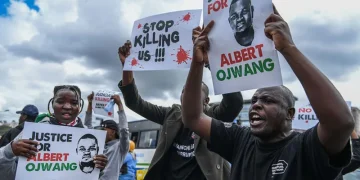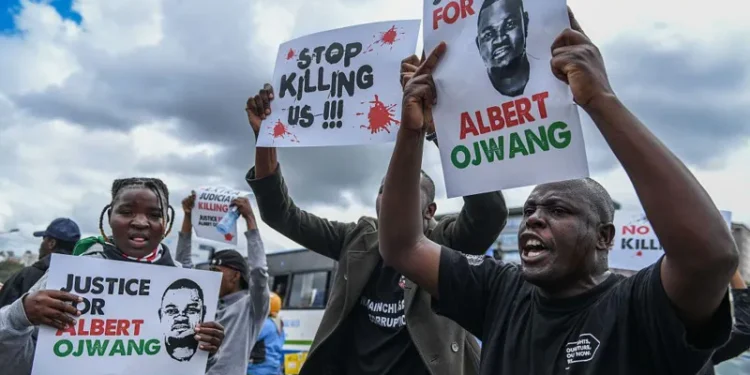Dozens of demonstrators gathered outside a mortuary in Nairobi to protest the death of 31-year-old Albert Omondi Ojwang, who died while in police custody. The incident has triggered public anger and calls for accountability in Kenya.
Ojwang was reportedly detained after a complaint was filed by Deputy Inspector General of Police Eliud Lagat, who accused him of defaming him on social media.
In their initial statement, police claimed Ojwang suffered fatal head injuries after hitting his head against a wall inside a cell. However, Julius Juma, the lawyer representing Ojwang’s family, disputed this account, saying the body showed signs of significant physical abuse, including swelling around the head, nose, and ears. He also noted bruises on the shoulders and arms that did not align with a single impact injury.
Kenya’s Independent Policing Oversight Authority (IPOA) has launched an investigation into the circumstances surrounding Ojwang’s death.
Chanting slogans like “Stop killing us,” protestors held placards as they gathered outside the Nairobi City Mortuary, where Ojwang’s body is being kept. The crowd later marched to the Central Police Station, where he had been held before his death.
Ojwang had been arrested in Homa Bay, western Kenya, on Friday due to a post on social media platform X that was allegedly critical of Deputy Inspector General Lagat. He was transferred over 350 kilometers to Nairobi, where he was booked into the Central Police Station the following day.
At a press conference, Inspector General of Police Japhet Koome confirmed that Ojwang’s arrest was based on Lagat’s complaint and that an inquiry had been initiated. Koome stated that senior officers from the Central Police Station had been interdicted—temporarily suspended from duty with half pay—pending the outcome of the IPOA investigation.
Police officials stated that Ojwang was found unconscious during a routine cell inspection and was taken to a hospital, where he was declared dead on arrival.
Irungu Houghton, Executive Director of Amnesty International Kenya, described the death as “deeply suspicious.” He expressed concern over the unusual decision to bypass the local police station in Homa Bay and instead transport Ojwang to Nairobi. Houghton also urged investigators to secure the police station where Ojwang was last held, calling it a potential crime scene.
Ojwang’s death comes amid growing fears over the treatment of government critics. Just last week, Rose Njeri, a software developer who built a platform to help Kenyans oppose a controversial finance bill, was charged under cybercrime legislation. She has denied the accusations.















